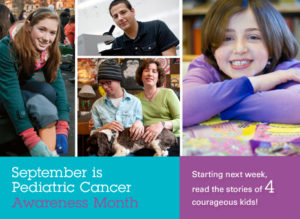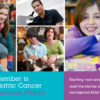September is National Childhood Cancer Awareness Month. Beginning next Wednesday, and over the next four weeks, we’ll introduce four children – Caitlynne, Fernando, Sarah and Steven – who while still young, have already overcome one of the biggest challenges of their lives.
These four represent just a few of the many faces of childhood cancer across the United States and the world. We hope you’ll join us in September in honoring all of the children who come to Dana-Farber/Children’s Hospital Cancer Center, as well as their caregivers—doctors, nurses, psychologists, social workers, researchers, administrators and more—who work tirelessly until every child is well.
 We begin with a conversation with Lisa Diller, MD, chief medical officer and clinical director of Pediatric Oncology at Dana-Farber/Children’s Hospital Cancer Center.
We begin with a conversation with Lisa Diller, MD, chief medical officer and clinical director of Pediatric Oncology at Dana-Farber/Children’s Hospital Cancer Center.
Read more

 As a soccer player and member of the track and field team at my high school, running is a big part of my life. But one morning I started getting shooting pains in my knee. All of a sudden walking and running became very difficult. In the blink of an eye I lost a big part of my identity, which hurt almost as much as my leg. Almost.
As a soccer player and member of the track and field team at my high school, running is a big part of my life. But one morning I started getting shooting pains in my knee. All of a sudden walking and running became very difficult. In the blink of an eye I lost a big part of my identity, which hurt almost as much as my leg. Almost. We begin with a conversation with
We begin with a conversation with